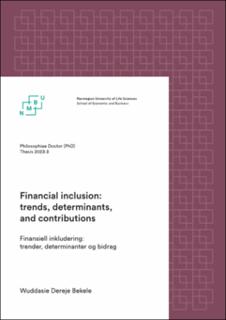| dc.contributor.advisor | Guttormsen, Atle | |
| dc.contributor.advisor | Øygard, Ragnar Arnljot | |
| dc.contributor.author | Bekele, Wuddasie Dereje | |
| dc.date.accessioned | 2023-09-13T12:11:37Z | |
| dc.date.available | 2023-09-13T12:11:37Z | |
| dc.date.issued | 2022 | |
| dc.identifier.isbn | 978-82-575-2032-8 | |
| dc.identifier.issn | 1894-6402 | |
| dc.identifier.uri | https://hdl.handle.net/11250/3089162 | |
| dc.description.abstract | Finansiell inkludering er avgjørende for et lands økonomi. Forskere, politikere og andre interessenter har en økende interesse for finansiell inkludering, og flere land har innlemmet det i sine nasjonale strategier. Denne oppgaven bidrar til litteraturen ved å analysere ulike aspekter ved finansiell inkludering. Hovedmålet er å undersøke trender og ulike faktorers bidrag til finansiell inkludering. Denne oppgaven består av fire uavhengige, men relaterte, forskningsartikler som alle setter søkelys på å identifisere de underliggende problemene relatert til finansiell inkludering. I artiklene presenteres også forslag til politikk.
I den første artikkelen studeres trendene i finansiell inkludering i Etiopia. Både utviklingen over tid og utviklingen mellom regioner analyseres. I artikkel to studeres faktorene som påvirker finansiell inkludering. Både faktorer som påvirker positivt og negativt diskuteres. Forskjeller på så vell makro som mikronivå mellom Kenya og Etiopias grad av finansiell inkludering identifiseres og diskuteres. Den tredje artikkelen analyserer hvordan og hvorvidt finansiell inkludering bidrar til at småskala bønder står bedre rustet til å møte klimaendringer. Artikkel fire analyseres hvordan finansiell inkludering kan bidra til å forbedre skatteadministrasjonen og ikke minst bidra til at skattene faktisk blir betalt.
Et viktig resultat i oppgaven er viktigheten av finansiell inkludering på flere områder. En anbefaling er derfor at finansiell inkludering blir sentralt i politikkutforming. Tilgjengeligheten av finansielle tjenester bør økes for befolkningen generelt. En kostnadseffektiv måte å gjøre det på er gjennom utvidelse av mobil- og agentbanktjenester. Ved å redusere transaksjonskostnaden kan nivået av finansiell inkludering forbedres både på tilbuds- og etterspørselssiden. Kunnskap om bank og finans bør styrkes for å øke bevisstheten i samfunnet om tilgjengelighet og bruk av finansielle tjenester. Dette fordi mangel på kunnskap er en av hovedårsakene til økonomisk ekskludering. I tillegg bør et mer liberalt finanssystem tilpasses. Ved å øke nivået av finansiell inkludering kan småbønder stå bedre rustet til å møte klimaendringer og skatteforvaltningen vil kunne bli mye bedre. Det å øke nivået av finansiell inkludering er et viktig bidrag for å forbedre et lands økonomi. | en_US |
| dc.description.abstract | Financial inclusion has a crucial contribution to the economy. Researchers, politicians, and other stakeholders are increasingly interested in financial inclusion, and countries have integrated it into their national strategies. This thesis contributes to the literature by analyzing different aspects of financial inclusion. The objective is to examine financial inclusion trends, determinants, and contributions. This thesis includes four independent but related research papers, focusing on identifying the underlying problems and making policy suggestions.
The first paper assesses Ethiopia's dynamic and spatial trend of financial inclusion. The level of financial inclusion is examined across time and regions to show the trend of financial inclusion and the discrepancy among the regions. Paper two investigates the determinants of and barriers to financial inclusion. It also identifies the macro and micro-level differences between Kenya and Ethiopia in their level of financial inclusion. The third paper analyzes the contribution of financial inclusion to climate resilience. Using the Sidama region of southern Ethiopia as a case study, this paper examines how financial inclusion contributes to building the climate resilience of farm households and what factors limit its contribution. Finally, paper four analyzes the role of financial inclusion in improving the Ethiopian tax administration and taxpayers' compliance and the limitations of financial services.
This thesis recommends improving the financial inclusion level as a major policy input. First, the availability of financial services should be increased at a lower cost through mobile and agent banking expansion. By reducing the transaction cost, the level of financial inclusion can be improved on both supply and demand sides. Second, financial literacy should be enhanced to increase society's awareness about the availability and use of financial services because lack of knowledge is one of the main reasons for financial exclusion. Finally, a more liberal financial system should be adopted. Increasing financial inclusion can magnify its contribution to tax administration and climate resilience. Therefore, enhancing the level of financial inclusion should be taken as a policy input to improve a country's economy. | en_US |
| dc.description.sponsorship | NORHED ; Hawassa University | en_US |
| dc.language.iso | eng | en_US |
| dc.publisher | Norwegian University of Life Sciences, Ås | en_US |
| dc.relation.ispartofseries | PhD thesis;2023:3 | |
| dc.rights | Navngivelse-Ikkekommersiell 4.0 Internasjonal | * |
| dc.rights.uri | http://creativecommons.org/licenses/by-nc/4.0/deed.no | * |
| dc.subject | Financial inclusion | en_US |
| dc.subject | Climate resilience | en_US |
| dc.subject | Tax administration | en_US |
| dc.subject | Tax compliance | en_US |
| dc.title | Financial inclusion : trends, determinants, and contributions | en_US |
| dc.title.alternative | Finansiell inkludering : trender, determinanter og bidrag | en_US |
| dc.type | Doctoral thesis | en_US |

